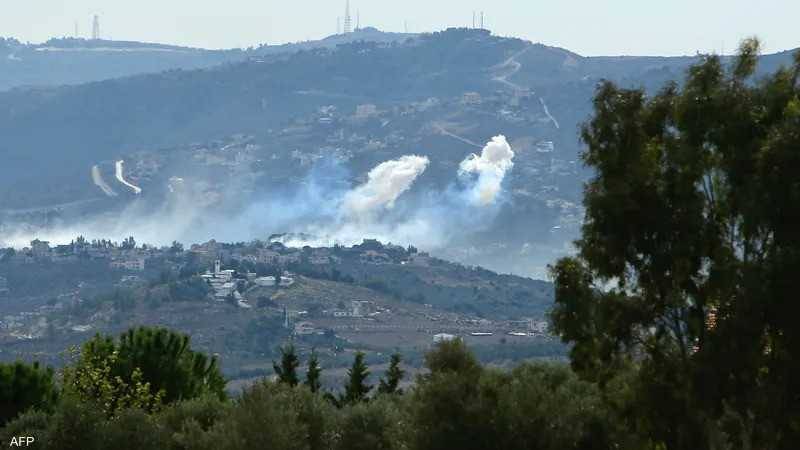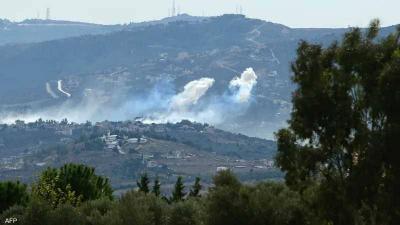The war in the south of Lebanon has entered its sixth month without any clear horizon, expanding into areas that were supposed to be distant, as well as extending targeted operations to the Bekaa Governorate, villages east of Sidon, and Marjeyoun. The war, described by Hezbollah as a distraction or a diversion in support of Gaza and Hamas, has lasted longer than anticipated and is beginning to exert pressure on Lebanese people in general and on Hezbollah's environment in particular due to mass displacement and significant destruction affecting southern border villages, in addition to hindering the economic movement in the south and keeping students away from their schools, as reported by "An-Nahar".
From the beginning of the war, it was clear that the Christian community, by a significant majority, rejected Hezbollah’s participation in the war. Even the long-time ally of Hezbollah, the Free Patriotic Movement, shifted its stance from supportive to vehemently opposing, asserting that Lebanon is "not bound by a defense agreement with Gaza." This sentiment was very evident in the Christian street despite the leadership's opinions.
The Druze community’s reality is quite similar to that of the Christians, except that its political leadership has opted for a conciliatory stance towards Hezbollah and refrained from politically confronting it as the Christian leaders did. This community has remained neutral by choosing silence, despite significant fears about the war's expansion amid a dire economic situation.
The biggest shift has come from the Sunni community, which has broken the barrier of separation from Hezbollah, even going as far as supporting the party's choices and operations at the beginning of the war due to an emotional connection with the Palestinian cause. However, this support started to wane over time, especially with the beginning of the current year, the escalation of the war in Gaza, and the realization that Hezbollah's involvement did not alleviate the suffering of Gaza, which has been completely destroyed, nor did it halt the conflict.
It has become evident that the rhetoric supporting the war in the south is declining. Although we have not seen a return to the previous anti-Hezbollah rhetoric that prevailed before the "Al-Aqsa Flood" operation, the discourse is now enveloped in the economic crisis and emphasizes the importance of focusing on the internal situation away from regional conflicts. Even the Islamic group, which had shown enthusiasm with the onset of the war, has seen its military actions diminish, aside from minor movements that recently led to the detainment of three young men who attempted to launch a single rocket after months of inactivity.
The role of the Fatwa House cannot be overlooked, as it expresses sympathy and support for what is happening in Palestine while simultaneously focusing on keeping the war out of Lebanon. Additionally, messages from former Prime Minister Saad Hariri subtly discussed extremism and the need to divert the specter of war, emphasizing the Palestinian cause without tying it to Lebanon.
In a recent international study published by the Washington Institute, a survey on the importance of advancing internal political and economic reforms at this time, over any issues related to foreign policy and remaining aloof from foreign wars, showed that a majority of surveyed Sunnis and Christians agreed with this proposal (66% and 74%, respectively), while about a quarter of Shiites agreed (27%). However, only 39% of Shiites strongly oppose this proposal.
The Shiite community remains the most prominent environment supporting the war, without a doubt, but the initial enthusiasm at the war's onset has begun to wane with the prolonged duration, high human losses, and massive destruction in villages, as well as the significant displacement exceeding 100,000 individuals and substantial economic and educational losses. Recently, voices of dissent have been rising from within the supportive environment questioning the goal of this war and whether it is fair for one community to pay the price for the Palestinian cause.
Although there are no official studies on the destruction and losses, some preliminary figures have started to emerge as the war continues to unfold daily. According to researcher Muhammad Shamseddine from the International Information Center, "1,500 homes were completely destroyed, 1,500 partially, and 4,000 incurred minor damages." On the agricultural front, losses are significant, ranging from the olive season to vegetable cultivation, with residents unable to benefit from their lands this year. Additionally, fruit trees were neglected, affecting the next season, which is a source of livelihood for many. Furthermore, the south as a whole is no longer a tourist destination, even in cities distant from border villages, which once saw record tourism numbers, not to mention the significant moral and educational losses resulting from the suspension of schools and universities in those areas.
The magnitude of these losses, combined with the fatigue of the supportive environment, is subjected to severe pressure campaigns against anyone who opposes or expresses any dissenting opinion about the war or even files a complaint. Numerous voices on social media have retracted their statements and apologized. For instance, a teacher who documented the fear of children in a school after an airstrike faced harsh backlash that forced her to apologize, as if there were efforts to strip away the human feeling of a child unaware of what is happening. Moreover, people continue to face various kinds of pressure in their work and livelihoods under the banner of "No talk about the war."
Dr. Mona Fayyad raises the question of who has truly heard the opinions of the people in the south. She asserts that Hezbollah is a tightly controlled party that dominates the Shiite environment; if some individuals dare to express their opinions, even if it's simply venting, they are summoned the next day to apologize for what they said. This situation aligns with what is known as "the snitching policy," emphasizing that public opinion in the south is not accurately reflected in reality.
She continues, "This does not mean that the people of the south are not with the resistance or have turned against it. Before the Gaza war, there was talk about how the people of the south lived in peace under the umbrella of Resolution 1701. But after the front opened, what happened? What changed in their circumstances?" She notes that "the idea that the people of the south support the war is absolutely incorrect and unrealistic. What some say on social media does not necessarily reflect the actual reality on the ground. Those who have been heavily affected by the war, displaced from their homes, lost their houses and livelihoods, do not support the war. But they have no other choice but to support Hezbollah in the absence of the state and while awaiting assistance from it."
Recently, there has been a campaign on the roads and social media titled "Shiites Against the War," although it does not reveal its identity or its activists. It adopts views from Shiite leaders who oppose the war, but it seems that the same pressure faced by the residents has led these groups to withhold their identities. In contrast, southern sources have pointed out the diligent efforts made by Hezbollah to maintain solidarity and compassion by repeatedly reassuring that the party will compensate the victims materially and restore their homes as they were. Additionally, the swift mourning and burial of combatants in their villages under fire aims to revive the spirit of empathy and revenge against those responsible for their deaths, something not seen in previous wars, according to "An-Nahar."
In this regard, Hezbollah's close allies comment: "Hezbollah's opponents and enemies recognize that despite the complaints, criticism, and fears due to the war and the current crisis, its supportive environment will not abandon it. In short, the supportive environment remains unchanged, it will complain and raise its voice in distress, yet it will not abandon its united leadership, whose members understand that it is the only shield protecting them from enemies both inside and outside."




